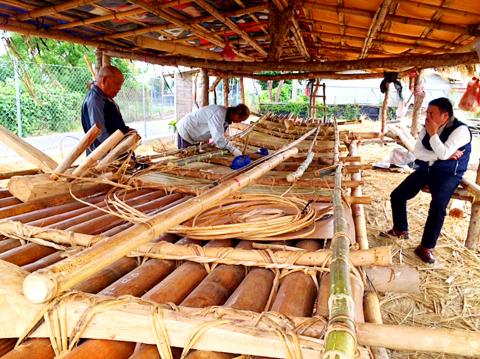A bamboo sailboat constructed using traditional shipbuilding techniques is to begin its maiden voyage off the coast of Taitung County next Monday, Amis activists from Taitung’s Farangaw Village announced yesterday.
The boat — named the Farangaw Autonomy — is to undertake a voyage to inspect the village’s traditional maritime territories, which activists hope will promote autonomous rule for Farangaw, as well as rally support for Aboriginal autonomy nationwide.
Villagers in Farangaw ceased production of traditional bamboo sailboats in the early years of Japanese colonial rule about 100 years ago, Council For Farangaw Autonomy chairperson Raranges Hoki Na Tungaw said.

Photo: Council For Farangaw Autonomy
“Through this voyage, we hope not only to reaffirm our traditional territories on land, but also to lay claim to our maritime territories,” Hoki said.
Five village elders in their 70s and 80s, although never having seen or built a bamboo sailboat themselves, led the project by relying on oral accounts of traditional shipbuilding they heard when they were young.
Bamboo from hills close to the village was harvested to construct the hull, while the ship’s sail was weaved from the leaves of screw pines found in coastal areas.
The villagers were once summoned to the police station for questioning after being accused of stealing the bamboo, which local authorities regard as public property, Hoki said.
Blasting government policies and laws which he said were “stifling” Aboriginal cultural development, Hoki called for Aboriginal sovereignty over traditional territories.
One of the main organizers of the event, National Taitung University professor Jesse Liu (劉炯錫) said access to the land and its resources was integral to the livelihood and cultural integrity of Aborigines.
Legal amendments to grant increased local autonomy should not be difficult as long as consensus is reached in Taiwanese society, Liu said, referencing as an example the Nov. 29 nine-in-one elections, which were modified in May to include the elections of Aboriginal district representatives and district council members.
Several other Aboriginal activists and representatives from around the nation also showed up to express solidarity with Farangaw’s cause, including Su Ching-chen (蘇金成), a Rukai Aborigine from Taitung’s Tarumak Village.
As Tarumak is located in Beinan Township (卑南) — home to a Han Chinese majority — Aboriginal voices are often unrepresented in local government, Su said.
Su demanded a redrawing of township boundaries to establish a new autonomous Aboriginal township, which would include Tarumak and some other Aborigine villages from neighboring townships.

A drunk woman was sexually assaulted inside a crowded concourse of Taipei Railway Station on Thursday last week before a foreign tourist notified police, leading to calls for better education on bystander intervention and review of security infrastructure. The man, surnamed Chiu (邱), was taken into custody on charges of sexual assault, taking advantage of the woman’s condition and public indecency. Police discovered that Chiu was a fugitive with prior convictions for vehicle theft. He has been taken into custody and is to complete his unserved six-month sentence, police said. On Thursday last week, Chiu was seen wearing a white

The Taoyuan Flight Attendants’ Union yesterday vowed to protest at the EVA Air Marathon on Sunday next week should EVA Airway Corp’s management continue to ignore the union’s petition to change rules on employees’ leave of absence system, after a flight attendant reportedly died after working on a long-haul flight while ill. The case has generated public discussion over whether taking personal or sick leave should affect a worker’s performance review. Several union members yesterday protested at the Legislative Yuan, holding white flowers and placards, while shouting: “Life is priceless; requesting leave is not a crime.” “The union is scheduled to meet with

‘UNITED FRONT’ RHETORIC: China’s TAO also plans to hold weekly, instead of biweekly, news conferences because it wants to control the cross-strait discourse, an expert said China’s plan to expand its single-entry visa-on-arrival service to Taiwanese would be of limited interest to Taiwanese and is a feeble attempt by Chinese administrators to demonstrate that they are doing something, the Mainland Affairs Council said yesterday. China’s Taiwan Affairs Office (TAO) spokesman Chen Binhua (陳斌華) said the program aims to facilitate travel to China for Taiwanese compatriots, regardless of whether they are arriving via direct flights or are entering mainland China through Hong Kong, Macau or other countries, and they would be able to apply for a single-entry visa-on-arrival at all eligible entry points in China. The policy aims

COUNTERMEASURE: Taiwan was to implement controls for 47 tech products bound for South Africa after the latter downgraded and renamed Taipei’s ‘de facto’ offices The Ministry of Foreign Affairs is still reviewing a new agreement proposed by the South African government last month to regulate the status of reciprocal representative offices, Minister of Foreign Affairs Lin Chia-lung (林佳龍) said yesterday. Asked about the latest developments in a year-long controversy over Taiwan’s de facto representative office in South Africa, Lin during a legislative session said that the ministry was consulting with legal experts on the proposed new agreement. While the new proposal offers Taiwan greater flexibility, the ministry does not find it acceptable, Lin said without elaborating. The ministry is still open to resuming retaliatory measures against South